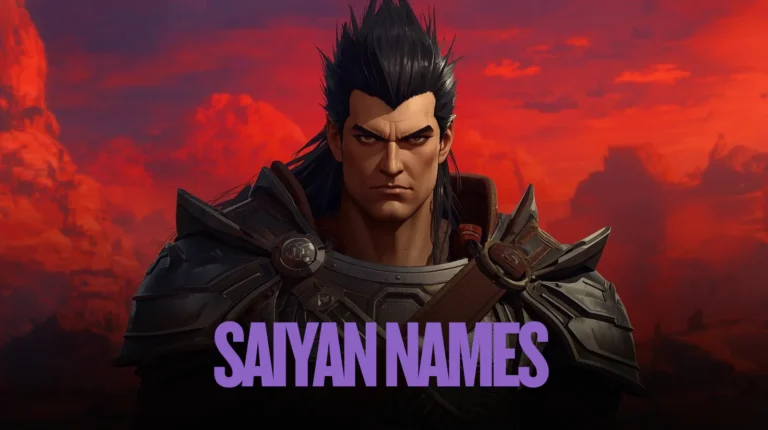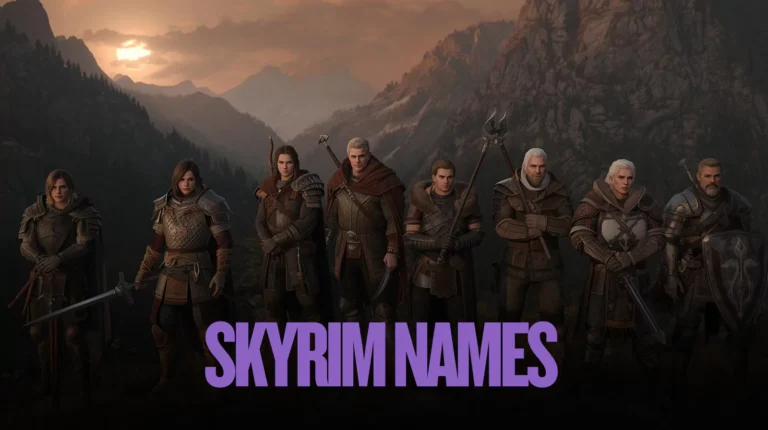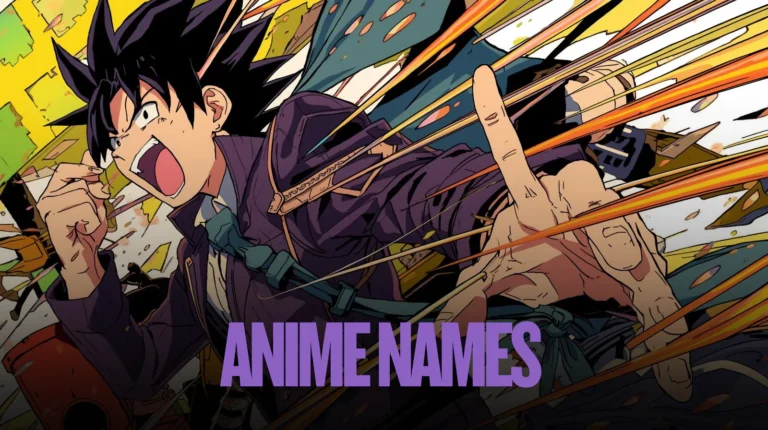Samurai Names Generator: Legendary, Cool And Japanese Meanings
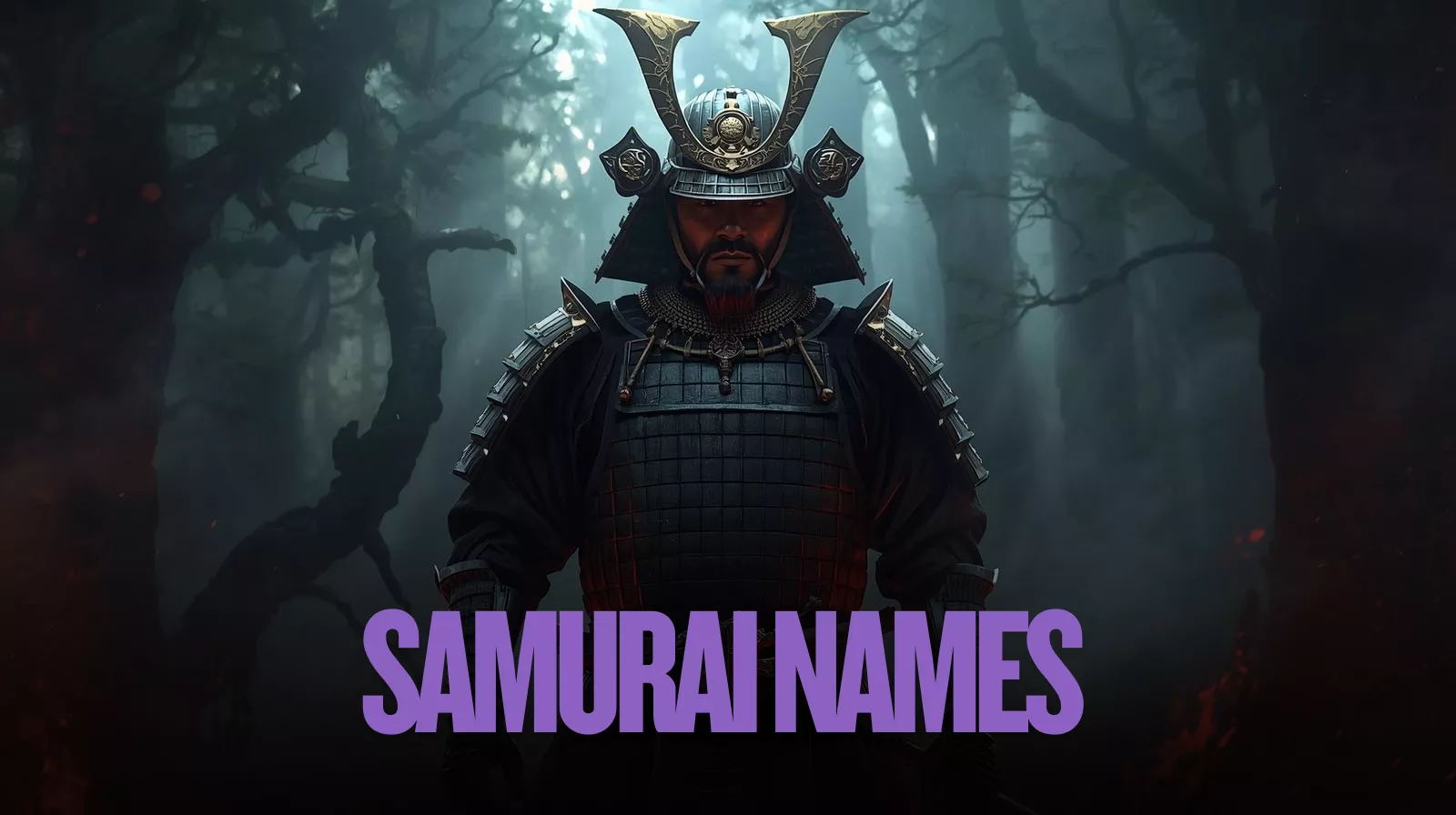
Samurai names echo the spirit of Japan’s legendary warriors. Rooted in centuries of tradition, these names often carry meanings tied to nature, strength, wisdom, and loyalty, reflecting the virtues of Bushido, the way of the warrior. Whether you’re creating a character for a story, game, or simply exploring the fascinating world of Japanese culture, samurai names offer timeless power and depth. Each name tells a story, embodying the bravery and pride of those who once shaped Japan’s history. From ancient battlefields to modern creativity, samurai names continue to inspire strength, legacy, and purpose.
Best Choices
Kenshin
Musashi
Takeda
Masamune
Why Samurai Names Are More Than Just Words
A samurai’s name wasn’t merely an identifier but it was a reflection of their soul, values, and destiny. Every name carried deep meaning, often symbolizing traits like honor, valor, or wisdom that defined the warrior’s path. These names served as lifelong reminders of duty and pride, linking individuals to their lineage, their lords, and the sacred code of Bushido. Even today, samurai names resonate beyond history, representing timeless ideals of strength, integrity, and the pursuit of excellence.
Best Fantasy Samurai Names
- Raiden (雷電) – Japanese – “God of thunder and lightning”; symbolizes power and fury.
- Takeshi (武) – Japanese – “Fierce warrior”; represents bravery and unyielding strength.
- Hikari (光) – Japanese – “Light”; signifies purity and hope amid battle.
- Kenshiro (拳四郎) – Japanese – “Fist of the fourth son”; linked with righteous warriors.
- Yamato (大和) – Japanese – “Great harmony”; ancient poetic name for Japan, embodying patriotism.
- Asahi (朝日) – Japanese – “Morning sun”; symbolizes new beginnings and courage.
- Renjiro (蓮次郎) – Japanese – “Lotus second son”; signifies rebirth and enlightenment.
- Arashi (嵐) – Japanese – “Storm”; represents unstoppable power and intensity.
- Sakurao (桜王) – Japanese – “Cherry blossom king”; reflects fleeting beauty and nobility.
- Hirotaka (寛隆) – Japanese – “Generous and noble”; represents honor and leadership.
- Kaien (海炎) – Japanese – “Ocean flame”; symbolizes duality; calm yet destructive.
- Tsubasa (翼) – Japanese – “Wings”; signifies freedom and spirit.
- Daigo (醍醐) – Japanese – “Ultimate enlightenment”; represents inner strength.
- Masaru (勝) – Japanese – “Victory”; denotes a triumphant warrior.
- Akihiko (明彦) – Japanese – “Bright prince”; noble and wise samurai archetype.
- Ryuunosuke (竜之介) – Japanese – “Child of the dragon”; symbolizes might and wisdom.
- Hayate (疾風) – Japanese – “Swift wind”; reflects agility and speed in combat.
- Kaito (海翔) – Japanese – “Ocean flight”; represents freedom and vast spirit.
- Naotaka (直隆) – Japanese – “Honest and noble”; signifies moral purity.
- Jinsei (人生) – Japanese – “Life”; a philosophical warrior who values existence and fate.
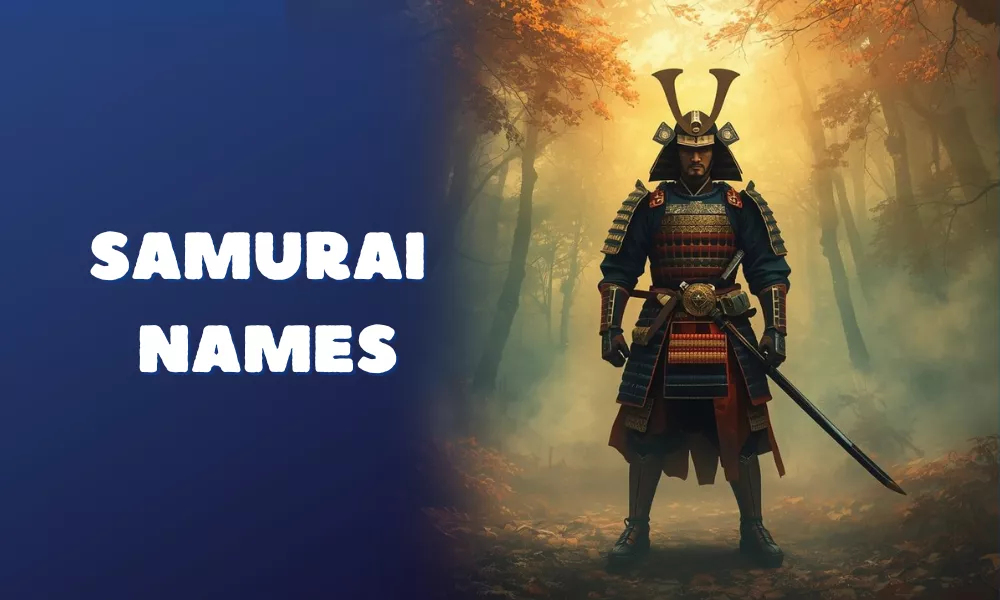
Cool & Edgy Names For Samurai
- Kuroda (黒田) – Japanese – “Black field”; symbolizes darkness and mystery.
- Ranmaru (蘭丸) – Japanese – “Orchid circle”; famous for youthful loyalty.
- Zenkai (善戒) – Japanese – “Virtuous oath”; signifies a warrior bound by moral code.
- Akuma (悪魔) – Japanese – “Demon”; for dark, feared warriors.
- Shirogane (銀) – Japanese – “Silver”; denotes elegance and cold resolve.
- Kazan (火山) – Japanese – “Volcano”; fiery temperament and explosive power.
- Rokuro (六郎) – Japanese – “Sixth son”; often used for calm yet fierce fighters.
- Hozumi (穂積) – Japanese – “Ear of grain”; symbolizes patience and growth.
- Makoto (誠) – Japanese – “Sincerity”; unbreakable moral resolve.
- Guren (紅蓮) – Japanese – “Crimson lotus”; fiery and untamed warrior spirit.
- Satsuo (殺男) – Japanese – “Killer man”; ruthless yet skilled fighter.
- Yoru (夜) – Japanese – “Night”; silent and deadly like the darkness.
- Kagehisa (影久) – Japanese – “Eternal shadow”; a master of stealth.
- Reiji (怜司) – Japanese – “Wise ruler”; cool-headed strategist.
- Oniyama (鬼山) – Japanese – “Demon mountain”; symbolizes power and fearlessness.
- Toraichi (虎一) – Japanese – “Tiger one”; ferocious and bold.
- Rikka (烈火) – Japanese – “Raging fire”; represents raw, untamed strength.
- Kuroshi (黒死) – Japanese-inspired fantasy – “Black death”; feared warrior of legends.
- Tenshin (天心) – Japanese – “Heavenly heart”; calm yet unstoppable.
- Ryouken (猟犬) – Japanese – “Hunting dog”; sharp, loyal, and relentless.
Trendy & Catchy Samurai Name Ideas
- Haruto (陽翔) – Japanese – “Sun flight”; bright and popular modern name.
- Souta (颯太) – Japanese – “Swift and strong”; energetic and cool.
- Riku (陸) – Japanese – “Land”; grounded and dependable warrior.
- Airi (愛梨) – Japanese – “Love and truth”; modern feminine samurai name.
- Itsuki (樹) – Japanese – “Tree”; signifies stability and growth.
- Takumi (匠) – Japanese – “Master craftsman”; skilled and intelligent fighter.
- Ayato (綾翔) – Japanese – “Elegant flight”; graceful yet fierce.
- Miyako (都) – Japanese – “Capital city”; symbolizes elegance and leadership.
- Kaito (海翔) – Japanese – “Ocean flyer”; trendy and adventurous.
- Ren (蓮) – Japanese – “Lotus”; simple yet symbolic of peace and renewal.
- Naomi (直美) – Japanese – “Honest beauty”; calm yet powerful.
- Reina (怜奈) – Japanese – “Wise and graceful”; modern feminine samurai aura.
- Shion (紫苑) – Japanese – “Aster flower”; symbolizes remembrance and resilience.
- Daiki (大輝) – Japanese – “Great radiance”; confident and heroic.
- Yuzuki (柚月) – Japanese – “Gentle moon”; beautiful and strong feminine name.
- Arata (新) – Japanese – “New”; symbolizes rebirth and change.
- Rin (凛) – Japanese – “Dignified”; short, elegant, and fierce.
- Haru (陽) – Japanese – “Sunlight”; bright and cheerful warrior.
- Mei (芽依) – Japanese – “Sprouting blessing”; soft yet strong spirit.
- Sora (空) – Japanese – “Sky”; limitless and free.
Creative & Unique Samurai Name Ideas
- Tsukikage (月影) – Japanese – “Moon shadow”; mysterious and poetic.
- Kazenari (風成) – Japanese – “Born of the wind”; symbolizes freedom.
- Enra (煙羅) – Japanese Mythology – “Spirit of smoke”; elusive and powerful.
- Hoshizora (星空) – Japanese – “Starry sky”; dreamer warrior.
- Kurogane (鉄) – Japanese – “Iron”; symbolizes resilience and strength.
- Aokami (青神) – Japanese-inspired fantasy – “Blue god/wolf”; noble and divine.
- Chikara (力) – Japanese – “Power”; embodiment of raw might.
- Shizukane (静鐘) – Japanese – “Silent bell”; calm but impactful.
- Renshou (蓮翔) – Japanese – “Lotus flight”; balanced and spiritual.
- Mikazuki (三日月) – Japanese – “Crescent moon”; graceful and sharp.
- Kurohana (黒花) – Japanese – “Black flower”; beauty with danger.
- Hinote (火の手) – Japanese – “Flame”; symbolizes life and destruction.
- Tensei (天星) – Japanese – “Heavenly star”; destiny-driven warrior.
- Kumogiri (雲切) – Japanese – “Cloud cutter”; swift and transcendent.
- Suiren (睡蓮) – Japanese – “Water lily”; calm strength and inner peace.
- Ryoujin (竜刃) – Japanese-inspired* – “Dragon blade”; mythic warrior title.
- Nozomi (望) – Japanese – “Hope”; symbolizes faith and perseverance.
- Akikaze (秋風) – Japanese – “Autumn wind”; elegant yet fleeting.
- Yamabiko (山彦) – Japanese – “Echo of the mountain”; spiritual guardian name.
- Kaoru (薫) – Japanese – “Fragrance”; unassuming yet powerful presence.
Funny & Quirky Names For Samurai
- Wasabiro (山葵郎) – Japanese – “Wasabi man”; fiery temper and spicy humor.
- Onigiri (おにぎり) – Japanese – “Rice ball”; loyal to his stomach before the sword.
- Sushiemon (寿司衛門) – Japanese parody – “Protector of sushi”; defender of deliciousness.
- Nekoichi (猫一) – Japanese – “Number one cat”; agile, lazy, and adored.
- Takozuna (蛸綱) – Japanese – “Octopus rope”; slippery and unpredictable fighter.
- Pikajiro (光次郎) – Japanese parody – “Son of lightning”; inspired by modern pop culture.
- Bakaemon (馬鹿衛門) – Japanese slang – “Foolish guardian”; brave but clumsy.
- Ramenmaru (拉麺丸) – Japanese – “Ramen boy”; fueled by noodles and spirit.
- Sumotaro (相撲太郎) – Japanese – “Wrestler boy”; samurai who dreams of sumo.
- Tempurao (天ぷ羅王) – Japanese parody – “King of Tempura”; crunchy warrior of the kitchen.
- Yawnatsu (欠伸夏) – Japanese – “Summer yawn”; lazy swordsman with sleepy charm.
- Kawauso (川獺) – Japanese folklore – “Otter spirit”; playful and mischievous fighter.
- Sakehiro (酒広) – Japanese – “Wide sake”; always drunk but surprisingly wise.
- Gohanji (ご飯次) – Japanese – “Second rice”; humble yet dependable companion.
- Wakarimashita (分かりました) – Japanese phrase – “I understand”; overly agreeable samurai.
- Ninjabaka (忍者馬鹿) – Japanese slang – “Ninja fool”; wannabe ninja samurai.
- Tofuhiko (豆腐彦) – Japanese – “Tofu prince”; soft-hearted yet pure.
- Okashiro (お菓子郎) – Japanese – “Sweet boy”; loves candy more than combat.
- Bananae (バナナ衛) – Japanese parody – “Banana guard”; comical but quick.
- Sarumaru (猿丸) – Japanese – “Little monkey”; cheeky and clever trickster.
Samurai Last Names
- Takeda (武田) – Japanese – “Brave warrior field”; famous samurai clan from Kai Province.
- Oda (織田) – Japanese – “Rice paddy weaver”; clan of the legendary Oda Nobunaga.
- Tokugawa (徳川) – Japanese – “River of virtue”; the ruling shogunate family of Edo era.
- Minamoto (源) – Japanese – “Origin”; one of Japan’s four great clans.
- Fujiwara (藤原) – Japanese – “Wisteria plain”; noble family of the Heian era.
- Shimazu (島津) – Japanese – “Island haven”; dominant samurai family from Kyushu.
- Mori (毛利) – Japanese – “Forest”; symbolizing strength and growth.
- Akechi (明智) – Japanese – “Bright wisdom”; linked with the tactician Akechi Mitsuhide.
- Honda (本多) – Japanese – “Root field”; loyal retainers of the Tokugawa.
- Date (伊達) – Japanese – “Elegant and bold”; famous for Date Masamune’s flamboyant style.
- Sanada (真田) – Japanese – “True field”; heroic clan from the Sengoku era.
- Hosokawa (細川) – Japanese – “Narrow river”; known for loyalty and artistry.
- Chosokabe (長宗我部) – Japanese – “Long religion clan”; fierce warriors of Shikoku.
- Uesugi (上杉) – Japanese – “Upper cedar”; rival of Takeda in Kanto region.
- Saito (斎藤) – Japanese – “Pure wisteria”; noble family with samurai roots.
- Hattori (服部) – Japanese – “Clothing weaver”; known for ninja-samurai Hattori Hanzo.
- Imagawa (今川) – Japanese – “Now river”; powerful clan of Suruga.
- Asakura (朝倉) – Japanese – “Morning storehouse”; respected feudal clan.
- Hojo (北条) – Japanese – “Northern castle”; shogunate regents during Kamakura period.
- Nagao (長尾) – Japanese – “Long tail”; ancestral family of Uesugi Kenshin.
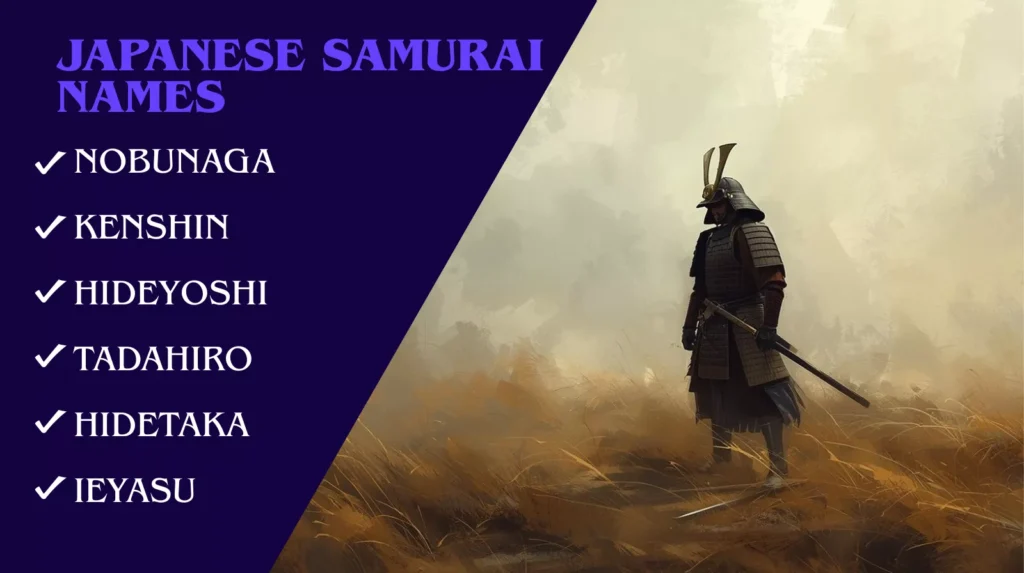
Samurai Anime Names
- Kenshin Himura (剣心) – Anime: Rurouni Kenshin – “Sword heart”; wandering swordsman seeking peace.
- Afro Samurai – Anime: Afro Samurai – A lone warrior driven by vengeance.
- Jin (仁) – Anime: Samurai Champloo – “Virtue”; calm and disciplined swordsman.
- Mugen (無限) – Anime: Samurai Champloo – “Infinite”; wild and free-spirited fighter.
- Giyu Tomioka (冨岡義勇) – Anime: Demon Slayer – “Righteous courage”; Water Hashira of the Corps.
- Roronoa Zoro (ロロノア・ゾロ) – Anime: One Piece – Based on real pirate Zorro; symbolizes willpower.
- Goemon Ishikawa XIII (石川五右衛門) – Anime: Lupin III – Descendant of legendary thief-samurai.
- Okita Sougo (沖田総悟) – Anime: Gintama – “Calm commander”; parody of Shinsengumi hero.
- Hijikata Toshirou (土方歳三) – Anime: Gintama – “Land fragment”; inspired by real Shinsengumi vice-commander.
- Kyojuro Rengoku (煉獄杏寿郎) – Anime: Demon Slayer – “Refined hell”; Flame Hashira of passion.
- Sanosuke Sagara (相楽左之助) – Rurouni Kenshin – “Left helper”; tough fighter with loyalty.
- Ichigo Kurosaki (黒崎一護) – Bleach – “Black cape guardian”; protector with samurai resolve.
- Byakuya Kuchiki (朽木白哉) – Bleach – “White night tree”; noble and stoic captain.
- Kenshiro (拳四郎) – Fist of the North Star – “Fist son”; inspired by samurai ideals.
- Inuyasha (犬夜叉) – Anime: Inuyasha – “Dog demon”; half-demon warrior with samurai traits.
- Aoshi Shinomori (四乃森蒼紫) – Rurouni Kenshin – “Blue violet”; skilled Oniwabanshu leader.
- Sakata Gintoki (坂田銀時) – Gintama – “Silver time”; comical yet noble samurai.
- Kensuke (剣介) – Various anime – “Sword helper”; classic samurai given name.
- Tengen Uzui (宇髄天元) – Demon Slayer – “Heavenly elegance”; flamboyant Sound Hashira.
- Shinsuke Takasugi (高杉晋助) – Gintama – “High cedar”; fierce rebel with samurai roots.
Japanese Samurai Names
- Musashi (武蔵) – Japanese – “Warrior storehouse”; after Miyamoto Musashi, master swordsman.
- Nobunaga (信長) – Japanese – “Trust and longevity”; famous warlord Oda Nobunaga.
- Kenshin (謙信) – Japanese – “Modest truth”; after Uesugi Kenshin, the Dragon of Echigo.
- Ieyasu (家康) – Japanese – “Tranquil home”; founder of the Tokugawa shogunate.
- Hideyoshi (秀吉) – Japanese – “Excellent fortune”; unifier of Japan.
- Tadahiro (忠弘) – Japanese – “Loyal and prosperous”; samurai virtue name.
- Masamune (政宗) – Japanese – “Right religion”; famous swordsmith and daimyo.
- Kagemasa (景政) – Japanese – “Bright justice”; heroic warrior of the Heian era.
- Yukimura (幸村) – Japanese – “Fortunate village”; Sanada clan’s heroic fighter.
- Tadayoshi (忠義) – Japanese – “Loyal righteousness”; devoted retainer’s ideal.
- Hidetaka (英隆) – Japanese – “Prosperous excellence”; refined warrior name.
- Toshinori (俊徳) – Japanese – “Virtuous genius”; wise samurai scholar.
- Aritomo (有朋) – Japanese – “Noble friend”; loyal companion name.
- Nobutada (信忠) – Japanese – “Faithful loyalty”; warrior of Oda lineage.
- Harunobu (春信) – Japanese – “Spring faith”; symbolizes renewal.
- Takakage (隆景) – Japanese – “Prosperous view”; thoughtful and tactical.
- Tadakatsu (忠勝) – Japanese – “Loyal victory”; famed Tokugawa general.
- Moritsugu (守次) – Japanese – “Protective heir”; defender of lineage.
- Naomasa (直政) – Japanese – “Honest governance”; Tokugawa’s Red Devil general.
- Shingen (信玄) – Japanese – “Faithful mystery”; Takeda clan’s legendary strategist.
Legendary Samurai Names
- Miyamoto Musashi (宮本武蔵) – Japanese – “Palace origin warrior”; undefeated swordsman and author of The Book of Five Rings.
- Oda Nobunaga (織田信長) – Japanese – “Trust and longevity”; ambitious warlord who began Japan’s unification.
- Toyotomi Hideyoshi (豊臣秀吉) – Japanese – “Abundant excellence”; peasant turned ruler.
- Tokugawa Ieyasu (徳川家康) – Japanese – “Peaceful home of virtue”; founder of lasting Tokugawa shogunate.
- Takeda Shingen (武田信玄) – Japanese – “Faithful mystery”; “Tiger of Kai,” rival to Uesugi Kenshin.
- Uesugi Kenshin (上杉謙信) – Japanese – “Modest truth”; “Dragon of Echigo,” noble and just general.
- Date Masamune (伊達政宗) – Japanese – “Right religion”; one-eyed “Dragon of the North.”
- Honda Tadakatsu (本多忠勝) – Japanese – “Loyal victory”; undefeated Tokugawa general.
- Sanada Yukimura (真田幸村) – Japanese – “Fortunate warrior”; symbol of loyalty and courage.
- Hattori Hanzo (服部半蔵) – Japanese – “Half-hidden”; master samurai and ninja tactician.
- Saito Dosan (斎藤道三) – Japanese – “Pure way three”; ruthless strategist known as the “Viper of Mino.”
- Katō Kiyomasa (加藤清正) – Japanese – “Pure justice”; brave general and castle builder.
- Ishida Mitsunari (石田三成) – Japanese – “Three achievements”; leader at the Battle of Sekigahara.
- Yagyu Munenori (柳生宗矩) – Japanese – “Willow faith ruler”; founder of Yagyū Shinkage-ryū sword style.
- Kato Yoshiaki (加藤嘉明) – Japanese – “Excellent brightness”; loyal general under Hideyoshi.
- Shimazu Yoshihiro (島津義弘) – Japanese – “Righteous prosperity”; feared general of the Shimazu clan.
- Asakura Yoshikage (朝倉義景) – Japanese – “Morning righteousness”; noble feudal lord.
- Hosokawa Tadaoki (細川忠興) – Japanese – “Loyal fortune”; cultured daimyo and warrior.
- Kusunoki Masashige (楠木正成) – Japanese – “True governance”; symbol of loyalty in Japanese history.
- Akechi Mitsuhide (明智光秀) – Japanese – “Bright light of wisdom”; betrayed Nobunaga, symbolizing tragic fate.
Traditional & Famous Samurai Names
- Minamoto no Yoshitsune (源 義経) – Minamoto clan hero; means “Virtuous Success.”
- Tokugawa Ieyasu (徳川 家康) – Founder of Tokugawa shogunate; means “Virtue, River, Tranquility.”
- Oda Nobunaga (織田 信長) – Warlord of unification; means “Trust and Long Ruler.”
- Toyotomi Hideyoshi (豊臣 秀吉) – Peasant-turned-ruler; means “Abundant Minister, Excellent Luck.”
- Takeda Shingen (武田 信玄) – Fierce strategist; means “Warrior Field, True Mystery.”
- Date Masamune (伊達 政宗) – One-eyed dragon; means “Elegant, Righteous Origin.”
- Sanada Yukimura (真田 幸村) – Loyal hero; means “True Field, Fortunate Village.”
- Miyamoto Musashi (宮本 武蔵) – Legendary swordsman; means “Palace Origin, Warrior Storehouse.”
- Akechi Mitsuhide (明智 光秀) – Betrayer of Nobunaga; means “Bright Wisdom, Shining Excellence.”
- Uesugi Kenshin (上杉 謙信) – God of War; means “Upper Wisteria, Humble Faith.”
- Saigō Takamori (西郷 隆盛) – Last true samurai; means “Western Village, Prosperous Growth.”
- Honda Tadakatsu (本多 忠勝) – Loyal general; means “True Field, Loyal Victory.”
- Hattori Hanzō (服部 半蔵) – Famous ninja samurai; means “Clothing Division, Half Storehouse.”
- Ito Ittosai (伊東 一刀斎) – Founder of a sword style; means “Eastern One-Sword Master.”
- Katō Kiyomasa (加藤 清正) – Castle builder and warrior; means “Increase Wisteria, Pure Justice.”
- Shimazu Yoshihisa (島津 義久) – Southern daimyo; means “Island Port, Loyal Long.”
- Hosokawa Tadaoki (細川 忠興) – Scholar-warrior; means “Narrow River, Loyal Rising.”
- Asakura Yoshikage (朝倉 義景) – Elegant lord; means “Morning Storehouse, Righteous Scene.”
- Amakusa Shirō (天草 四郎) – Christian samurai; means “Heaven Grass, Fourth Son.”
- Kusunoki Masashige (楠木 正成) – Loyal strategist; means “Camphor Tree, Righteous Success.”
Samurai Family Names
- Minamoto (源) – “Origin” or “Source”; noble imperial descendants.
- Taira (平) – “Peace” or “Calm”; rival clan of Minamoto.
- Fujiwara (藤原) – “Wisteria Field”; aristocratic clan.
- Takeda (武田) – “Warrior Field”; known for strong cavalry.
- Tokugawa (徳川) – “Virtuous River”; ruling shogunate family.
- Oda (織田) – “Weaver Field”; symbolizing craftsmanship and leadership.
- Toyotomi (豊臣) – “Abundant Minister”; title given by Emperor.
- Date (伊達) – “Elegant, Dashing”; symbol of style and sophistication.
- Sanada (真田) – “True Field”; symbol of loyalty.
- Akechi (明智) – “Bright Wisdom”; intelligent and strategic lineage.
- Uesugi (上杉) – “Upper Wisteria”; noble and refined heritage.
- Shimazu (島津) – “Island Port”; southern warriors of Kyushu.
- Honda (本多) – “True Field”; represents loyalty and service.
- Hosokawa (細川) – “Narrow River”; refined and educated samurai clan.
- Chōsokabe (長宗我部) – “Long Religious Group”; known for seafaring.
- Imagawa (今川) – “Present River”; cultured and strategic family.
- Mōri (毛利) – “Forest of Fur”; ancient and strong clan.
- Saitō (斎藤) – “Pure Wisteria”; purity and tradition.
- Hōjō (北条) – “Northern Castle”; powerful shogunate family.
- Asakura (朝倉) – “Morning Storehouse”; known for elegance and artistry.
Samurai Sword Names
- Kusanagi-no-Tsurugi (草薙の剣) – “Grass-Cutting Sword”; mythical imperial blade.
- Muramasa (村正) – “Village Justice”; forged by a legendary, cursed smith.
- Masamune (正宗) – “True Religion”; masterpiece of swordcraft.
- Tsurugi (剣) – “Double-edged sword”; symbol of divine authority.
- Kogarasu Maru (小烏丸) – “Little Crow”; famed curved sword of legend.
- Honjo Masamune (本庄正宗) – “True Manor, True Faith”; national treasure blade.
- Onimaru (鬼丸) – “Demon Circle”; sword of the Taira clan.
- Okanehira (大包平) – “Great Flat Package”; among Japan’s greatest swords.
- Mikazuki Munechika (三日月宗近) – “Crescent Moon Blade”; beautiful curve and craftsmanship.
- Juzumaru (数珠丸) – “Rosary Sword”; symbol of faith and peace.
- Doji-giri Yasutsuna (童子切安綱) – “Slayer of the Demon Shuten Dōji”; heroic sword.
- Fudo Masamune (不動正宗) – “Immovable True Faith”; symbolic of strength.
- Yasutsuna (安綱) – “Peace Rope”; one of Japan’s oldest blades.
- Shishi-ō (獅子王) – “Lion King”; regal and powerful sword.
- Raikiri (雷切) – “Lightning Cutter”; fabled for cutting lightning itself.
- Tenkatsukasa (天上司) – “Heavenly Authority”; blade of divine right.
- Kotetsu (虎徹) – “Iron Tiger”; famous Edo-period swordsmith’s blade.
- Izumo-no-Kami Kanesada (出雲守兼定) – “Guardian of Izumo”; famed sword of warriors.
- Yamatorige (山鳥毛) – “Mountain Bird Feather”; beauty and precision.
- Otegine (大手斧) – “Great Hand Axe”; symbol of strength and valor.
Japanese-Inspired Samurai Names
- Ryuunosuke (龍之介) – “Son of the Dragon”; fierce and noble.
- Takeshi (武) – “Warrior”; embodies bravery.
- Kenshiro (拳四郎) – “Fist Warrior”; strength and resolve.
- Haruto (陽翔) – “Sun Flight”; light and freedom.
- Arata (新) – “New, Fresh”; symbol of renewal.
- Daichi (大地) – “Great Earth”; grounded and steadfast.
- Souta (颯太) – “Swift Wind”; speed and agility.
- Hiroshi (寛) – “Generous, Tolerant”; wise and kind samurai.
- Renji (蓮司) – “Lotus Ruler”; spiritual and pure.
- Akihiko (明彦) – “Bright Prince”; noble and radiant.
- Masaru (勝) – “Victory”; embodies triumph.
- Hayato (隼人) – “Falcon Person”; quick and sharp-minded.
- Ryota (涼太) – “Cool, Great”; calm under pressure.
- Kaito (海翔) – “Ocean Flyer”; free and fearless.
- Satoru (悟) – “Enlightened”; wise warrior.
- Tadashi (忠) – “Loyal”; symbol of faithfulness.
- Kazuki (和樹) – “Peace Tree”; balance and harmony.
- Naoki (直樹) – “Honest Tree”; integrity and strength.
- Haruya (春也) – “Spring Gentleman”; renewal and warmth.
- Isamu (勇) – “Courage”; pure embodiment of samurai spirit.
Good Samurai Name With Meanings
| Name | Meaning |
|---|---|
| Kenshin (剣心) | “Sword Heart”; symbolizes the pure spirit of a warrior. |
| Takeshi (武) | “Warrior”; brave and strong. |
| Haruto (陽翔) | “Sun Flight”; radiant and free-spirited. |
| Masaru (勝) | “Victory”; symbol of triumph. |
| Ryuji (龍司) | “Dragon Master”; fierce and noble. |
| Isamu (勇) | “Courage”; embodies bravery and honor. |
| Kaito (海翔) | “Ocean Flyer”; calm yet powerful. |
| Akio (昭雄) | “Bright Hero”; shining champion. |
| Daiki (大輝) | “Great Radiance”; one who inspires others. |
| Souta (颯太) | “Swift Wind”; quick and agile. |
| Hiroto (大翔) | “Great Flight”; freedom and strength. |
| Renji (蓮司) | “Lotus Ruler”; purity and discipline. |
| Tadashi (忠) | “Loyal”; faithful and righteous. |
| Naoki (直樹) | “Honest Tree”; moral and grounded. |
| Kensuke (健介) | “Healthy Helper”; strong protector. |
| Makoto (誠) | “Sincerity”; truth and honor. |
| Arata (新) | “New Beginning”; symbolizes renewal. |
| Shinji (真司) | “True Ruler”; integrity and control. |
| Haru (陽) | “Sunlight”; warmth and life. |
| Yamato (大和) | “Great Harmony”; ancient name for Japan itself. |
Male Samurai Names
| Name | Origin & Meaning |
|---|---|
| Ryohei (良平) | “Good and Peaceful”; calm and dependable. |
| Takashi (隆) | “Noble, Prosperous”; symbol of high rank. |
| Noboru (昇) | “To Rise”; ambitious samurai spirit. |
| Katsuro (勝郎) | “Victorious Son”; triumphant and bold. |
| Toshiro (俊郎) | “Talented Son”; gifted and smart. |
| Hideaki (秀明) | “Excellent Brightness”; wise and honorable. |
| Yukio (幸雄) | “Fortunate Hero”; luck and strength. |
| Ichiro (一郎) | “First Son”; leadership and pride. |
| Hajime (始) | “Beginning”; symbol of a new start or duty. |
| Masato (正人) | “Righteous Person”; moral and just. |
| Kenzou (健三) | “Strong and Steady”; dependable warrior. |
| Ren (蓮) | “Lotus”; purity and serenity amidst battle. |
| Daisuke (大輔) | “Great Helper”; loyal companion. |
| Shun (俊) | “Talented”; fast and skillful. |
| Ryota (涼太) | “Cool and Great”; calm strategist. |
| Hideo (英夫) | “Excellent Man”; admired for wisdom. |
| Takumi (匠) | “Master Craftsman”; precision and skill. |
| Satoshi (智) | “Wise”; thoughtful and intellectual. |
| Jiro (次郎) | “Second Son”; loyal and supportive. |
| Kenta (健太) | “Healthy and Strong”; symbol of vitality. |
Female Samurai Names
| Name | Origin & Meaning |
|---|---|
| Aiko (愛子) | “Child of Love”; gentle yet strong-hearted. |
| Chiyo (千代) | “Eternal Generation”; lasting legacy. |
| Hana (花) | “Flower”; grace and beauty in strength. |
| Keiko (恵子) | “Blessed Child”; virtuous and kind. |
| Miyu (美優) | “Beautiful Gentleness”; balanced spirit. |
| Reina (怜奈) | “Wise and Graceful”; intelligent warrior. |
| Ayaka (彩花) | “Colorful Flower”; creativity and elegance. |
| Sakura (桜) | “Cherry Blossom”; fleeting yet beautiful life. |
| Tomoe (巴) | “Circle”; inspired by Tomoe Gozen, famous female samurai. |
| Naomi (直美) | “Honest Beauty”; pure-hearted. |
| Haruka (遥) | “Distant”; far-reaching influence. |
| Akira (明) | “Bright, Clear”; sharp mind and clarity. |
| Emiko (笑子) | “Smiling Child”; cheerful and brave. |
| Kiyomi (清美) | “Pure Beauty”; symbol of purity. |
| Rina (里奈) | “Village Beauty”; simple yet resilient. |
| Sayuri (小百合) | “Little Lily”; innocence with hidden strength. |
| Yumeko (夢子) | “Dream Child”; visionary and determined. |
| Asami (麻美) | “Morning Beauty”; fresh and radiant. |
| Hikari (光) | “Light”; beacon of hope and guidance. |
| Megumi (恵) | “Blessing”; compassionate and noble. |
Unisex Samurai Name Ideas
- Akira (明) – “Bright”; clarity of purpose (used for both genders).
- Ren (蓮) – “Lotus”; calm and pure spirit.
- Haru (陽) – “Sun”; warmth and renewal.
- Makoto (誠) – “Truth”; honesty and virtue.
- Riku (陸) – “Land”; grounded and strong.
- Sora (空) – “Sky”; free-spirited and open-minded.
- Kai (海) – “Ocean”; depth and calm power.
- Aoi (葵) – “Hollyhock Flower”; noble and ancient.
- Hinata (陽向) – “Facing the Sun”; positivity and courage.
- Nao (直) – “Honest”; straightforward and loyal.
- Mika (美香) – “Beautiful Fragrance”; graceful strength.
- Rin (凛) – “Dignified”; calm confidence.
- Tomo (智) – “Wisdom”; intellect and insight.
- Yuki (雪 / 幸) – “Snow” or “Happiness”; peaceful nature.
- Kou (光) – “Light”; illumination and justice.
- Aki (秋) – “Autumn”; wisdom from experience.
- Minori (実り) – “Harvest”; fruitful and steady.
- Naru (成) – “To Become”; growth and destiny.
- Shion (紫苑) – “Aster Flower”; remembrance and grace.
- Rei (礼) – “Courtesy”; respect and harmony.
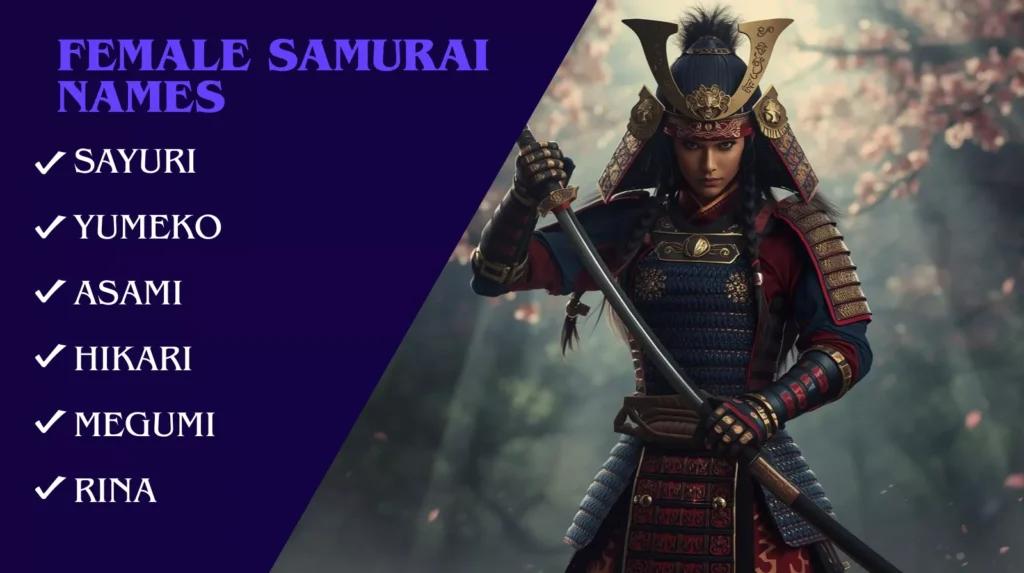
Samurai Nicknames
- The Crimson Blade – for a warrior who never falters in battle.
- Silent Wind – for a stealthy and swift fighter.
- Iron Shadow – symbolizes impenetrable defense.
- Silver Fang – sharp and precise warrior.
- Storm Walker – one who thrives in chaos.
- Moon Fang – poetic name for a night fighter.
- Black Crane – graceful yet deadly.
- Fallen Cherry – symbolizes fleeting yet noble life.
- The Wolf of Edo – lone yet loyal samurai.
- Scar of Honor – one who bears the mark of valor.
- Dragon’s Echo – fierce spirit that lingers.
- Crimson Sparrow – agile and beautiful in motion.
- The Wandering Blade – traveler seeking purpose.
- Blinding Dawn – represents justice and clarity.
- Whispering Steel – stealth and precision.
- The Last Ronin – masterless but proud.
- Shadow Flame – burning spirit within darkness.
- Moonlight Fang – elegant yet fierce fighter.
- Silent Rain – quiet, disciplined, and graceful.
- Iron Phoenix – rebirth through battle and honor.
Samurai Username
- SilentKatana – calm and precise like a true samurai’s blade.
- CrimsonRonin – symbolizes a masterless warrior stained by battle.
- ShogunSoul – the spirit of a true leader and tactician.
- ZenStrike – balance and precision in every move.
- BladeOfEdo – homage to samurai from the Edo era.
- ShadowKensei – “Sword Saint” hidden in the dark.
- BushidoBound – devoted follower of the samurai code (Bushidō).
- SakuraSteel – blend of beauty (Sakura = cherry blossom) and strength.
- RoninGhost – wandering soul of a fallen samurai.
- DragonOfNippon – powerful protector of Japan (Nippon).
- KyotoBlade – elegant yet deadly warrior from Kyoto.
- LoneKatana – solitary fighter with unmatched skill.
- TheSilverShogun – symbolizes noble leadership.
- MoonlightRonin – poetic name for a warrior under the moon.
- TsubaWolf – Tsuba (guard of a sword) + wolf, symbol of protection.
- SpiritOfMusashi – named after legendary samurai Miyamoto Musashi.
- CrimsonDaimyo – powerful warlord with a fierce heart.
- SilentBushido – the quiet strength of samurai virtue.
- AshenKenshi – “Sword Master” born from ashes.
- StormRonin – drifter who fights like thunder.
One Word Evil Names For Samurai
- Kurojin (黒刃) – “Black Blade”; dark-hearted swordsman.
- Onimaru (鬼丸) – “Demon Circle”; cursed spirit warrior.
- Akuma (悪魔) – “Devil”; pure embodiment of evil.
- Yamika (闇火) – “Dark Flame”; burns within shadows.
- Retsudo (烈土) – “Fierce Earth”; unrelenting warrior.
- Kageura (影裏) – “Hidden Shadow”; unseen and deadly.
- Kuragane (暗金) – “Dark Metal”; cold and ruthless.
- Makuro (真黒) – “Pure Black”; soul consumed by void.
- Noraku (呪落) – “Cursed Descent”; fallen from honor.
- Shiryō (死霊) – “Dead Spirit”; ghostly killer.
- Yūrei (幽霊) – “Vengeful Ghost”; restless and cold.
- Gokudō (極道) – “Extreme Path”; corrupted Bushidō.
- Kuronami (黒波) – “Black Wave”; unstoppable and consuming.
- Dokuzen (毒善) – “Poisoned Virtue”; false righteousness.
- Kurai (暗い) – “Dark”; shadowed heart.
- Tsukigiri (月斬) – “Moon Slayer”; silent killer under moonlight.
- Ranzou (乱蔵) – “Chaotic Store”; embodies destruction.
- Enma (閻魔) – “Lord of Hell”; judge of the underworld.
- Zankoku (残酷) – “Cruelty”; merciless soul.
- Mujō (無常) – “Impermanence”; emotionless destroyer.
Modern & Trending Names With Samurai Style
- Kairo (海朗) – “Sea Light”; modern, strong, and spiritual.
- Renzo (蓮蔵) – “Lotus Storehouse”; peaceful yet powerful.
- Arashi (嵐) – “Storm”; symbolizes fierce energy.
- Kaito (海翔) – “Ocean Flyer”; freedom and courage.
- Haruya (春也) – “Spring Gentleman”; renewal and grace.
- Ryuunosuke (龍之介) – “Dragon’s Child”; bold and proud.
- Aoshi (葵士) – “Blue Warrior”; calm and intelligent.
- Naoya (直也) – “Honest and True”; modern sense of integrity.
- Itsuki (樹) – “Tree”; steady and grounded spirit.
- Minato (湊) – “Harbor”; refuge and strength.
- Rikuya (陸也) – “Land and Harmony”; balance and endurance.
- Kenshiro (拳四郎) – “Fist Warrior”; symbol of power and control.
- Hiroki (弘樹) – “Expansive Tree”; stability and growth.
- Souta (颯太) – “Swift Wind”; agile and modern hero.
- Asahi (旭) – “Rising Sun”; new dawn, bright energy.
- Daigo (大悟) – “Great Enlightenment”; spiritual awakening.
- Shion (紫苑) – “Aster Flower”; elegant and calm.
- Renya (蓮也) – “Lotus Gentleman”; peace and grace.
- Tsubasa (翼) – “Wings”; symbol of freedom.
- Hiroto (大翔) – “Great Flight”; soaring warrior spirit.
Samurai Pop Culture Inspired Names
- KenshinHimura – from Rurouni Kenshin; “Sword Heart” wandering samurai.
- JinSakai – from Ghost of Tsushima; “Truthful Hero.”
- MusashiMiyamoto – legendary swordsman; “Palace Origin, Warrior Storehouse.”
- AfroSamurai – iconic pop culture samurai with vengeance theme.
- O-RenIshii – from Kill Bill; “Cold, Elegant Assassin.”
- GoemonIshikawa – master thief samurai; “Gate Protector.”
- ShinobuKocho – from Demon Slayer; “Enduring Butterfly.”
- GenjiShimida – from Overwatch; “Two Beginnings,” cyber samurai.
- HanzoHasashi – from Mortal Kombat; “Half Storehouse,” spirit of vengeance.
- Yojimbo – inspired by Kurosawa’s film; “Bodyguard.”
- ToshiroMifune – legendary actor in samurai films; “Talented Son.”
- RaidenShogun – from Genshin Impact; “Thunder General.”
- OdaNobunaga – historical figure in countless games/anime.
- Sesshomaru – from Inuyasha; “Destruction Circle.”
- RurouniBlade – homage to Rurouni Kenshin.
- GhostOfEdo – nod to Ghost of Tsushima with Tokyo roots.
- KyoshiWarrior – from Avatar: The Last Airbender; “Warrior of Balance.”
- HattoriHanzo – famous ninja-samurai; “Clothing Division, Half Storehouse.”
- BladeOfTsushima – fan-inspired name for noble vengeance.
- Zatoichi – blind swordsman from film legend; “Seat One.”
A – Z Names For Samurai
- A – Akihiko (明彦) – “Bright Prince”; noble warrior.
- B – Botan (牡丹) – “Peony”; symbol of bravery.
- C – Chikara (力) – “Power”; strength and endurance.
- D – Daichi (大地) – “Great Earth”; stability and honor.
- E – Eiji (栄治) – “Prosperity and Rule”; disciplined leader.
- F – Fujin (風神) – “Wind God”; swift and unpredictable.
- G – Goro (五郎) – “Fifth Son”; dependable fighter.
- H – Hiroshi (寛) – “Generous”; wise and calm.
- I – Isamu (勇) – “Courage”; fearless spirit.
- J – Junpei (順平) – “Obedient Peace”; loyal companion.
- K – Kenta (健太) – “Healthy and Strong”; determined warrior.
- L – Lian (蓮) – “Lotus”; purity and enlightenment (used in hybrid names).
- M – Masato (正人) – “Righteous Person”; virtuous leader.
- N – Nobu (信) – “Faith”; steadfast loyalty.
- O – Osamu (修) – “Discipline”; master of self-control.
- P – Panku (判空) – “Judged Sky”; rare Zen-inspired name.
- Q – Quinjo (琴城) – “Harp Castle”; poetic and noble.
- R – Riku (陸) – “Land”; grounded and balanced.
- S – Shinji (真司) – “True Ruler”; integrity and power.
- T – Takeshi (武) – “Warrior”; classic samurai virtue.
- U – Uta (詩) – “Poem”; poetic and gentle fighter.
- V – Vayro (架龍) – “Framed Dragon”; modern samurai flair.
- W – Wataru (渉) – “To Cross”; traveler or wanderer.
- X – Xanko (残光) – “Lingering Light”; rare hybrid name.
- Y – Yoshinobu (義信) – “Righteous Faith”; just and loyal.
- Z – Zenko (善光) – “Good Light”; peace and clarity.
Fun Facts About Samurai
- Samurai Weren’t Just Warriors But They Were Artists Too – Many samurai practiced poetry, calligraphy, and tea ceremonies. They believed mastering art refined the spirit, balancing the violence of battle with inner peace.
- Female Samurai Existed, Known as “Onna-Bugeisha” – Women like Tomoe Gozen and Nakano Takeko were skilled fighters who led troops and defended castles, proving that honor and courage weren’t limited to men.
- Their Armor Was Designed for Both Fear and Flexibility – Samurai armor (yoroi) was crafted from lacquered leather and iron plates, allowing movement in combat and its fearsome masks (menpo) were meant to intimidate enemies.
- Samurai Had Their Own “Death Poems” – Before battle or ritual death, samurai often composed jisei, short reflective poems capturing their acceptance of fate and the impermanence of life.
- Not All Carried Katanas – High-ranking samurai wielded elegant katanas, while foot soldiers used spears (yari) or bows (yumi). The sword became a symbol of status more than a battlefield necessity.
Tips for Creating Your Own Samurai Name
- Blend Nature and Virtue – Combine words tied to nature (Kaze = wind, Ryu = dragon, Hana = flower) with virtues (Ken = sword, Shin = heart, Tada = loyalty).
- Use Kanji Meanings with Symbolism – Choose kanji that represent personal qualities to create depth and story in your name.
- Balance Power and Elegance – Great samurai names sound strong but refined. Try pairing a hard consonant start (T, K, R) with a softer ending (-shi, -ro, -ta).
- Include Clan or Place Names for Authenticity – Add a regional touch or family prefix like Takeda, Uesugi, or of Kyoto to make your character feel rooted in history.
- Reflect the Character’s Journey or Spirit – A samurai’s name can mirror their destiny whether its peace, vengeance, honor, or rebirth. Choose meanings that fit their personality or backstory.
FAQs
Conclusion
Samurai names are more than just words but they’re symbols of honor, strength, and a timeless warrior spirit. Rooted in centuries of Japanese culture, each name carries stories of bravery, wisdom, and loyalty. Whether you’re crafting a character for a novel, designing a hero for a game, or simply fascinated by Japanese history, a samurai name adds depth, meaning, and power. From legendary warriors like Miyamoto Musashi and Oda Nobunaga to creative, fantasy-inspired names like Ryushin or Tensei, every name tells a tale of courage and identity.

